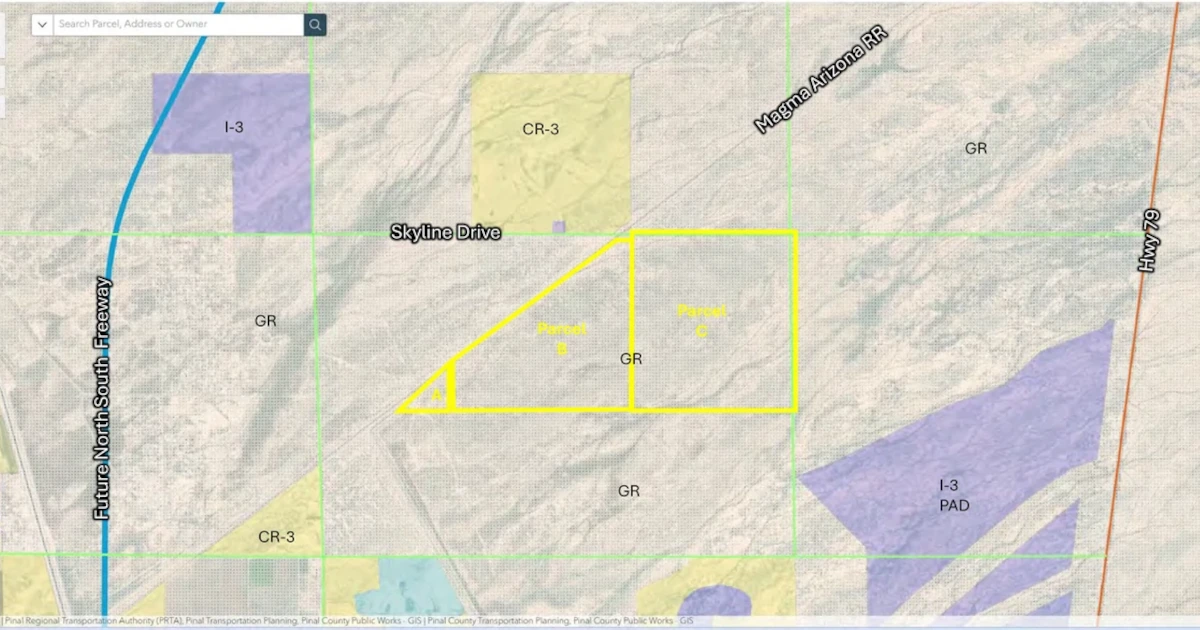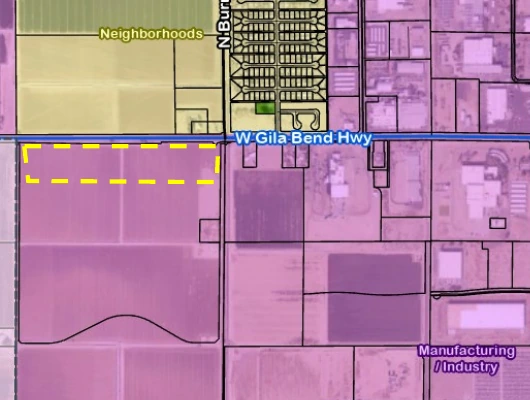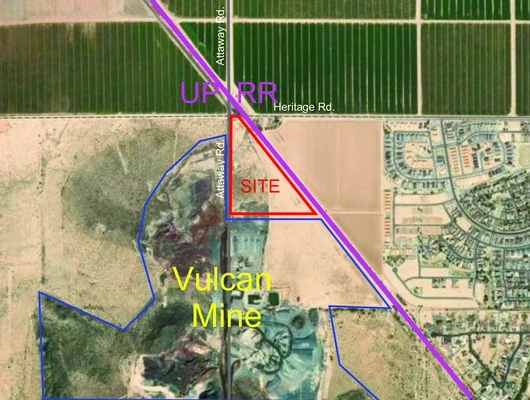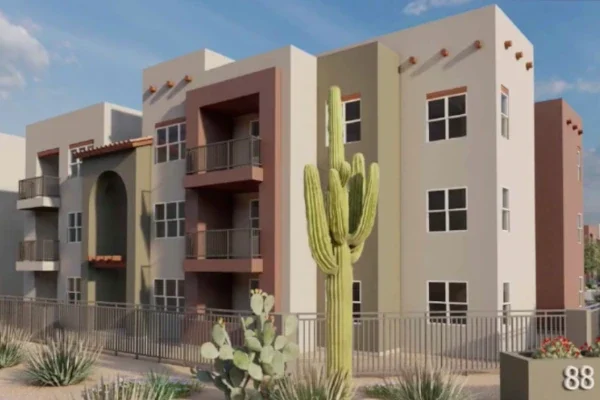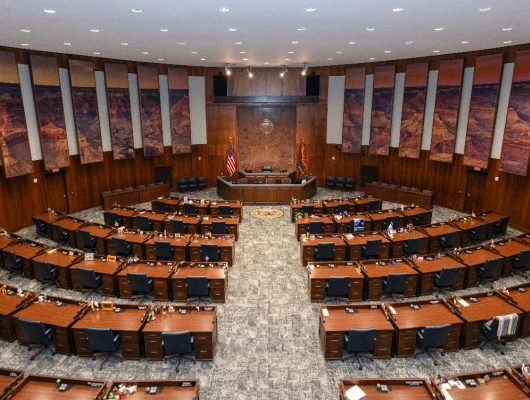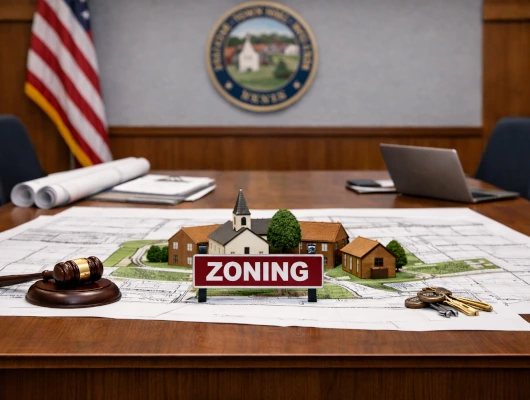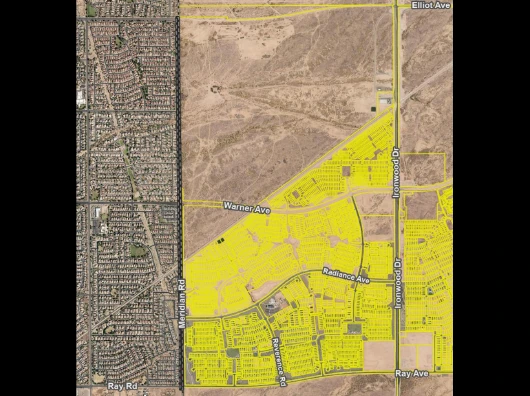Florence, AZ — The Pinal County Board of Supervisors unanimously approved three land-use applications on October 15 for an industrial development north of Florence. The 1,105-acre project, known as Project Ranger, will trigger new road construction and could revive the dormant Magma Arizona Railroad.
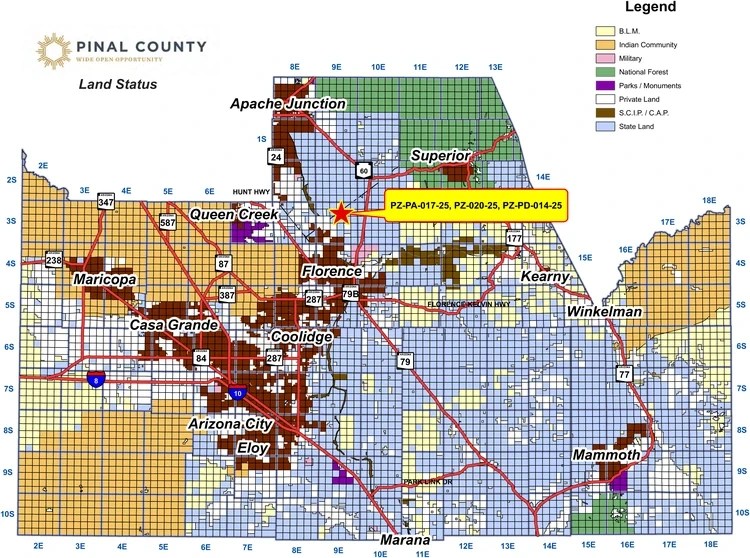
The approval follows the Planning and Zoning Commission’s unanimous recommendation from September 18. Details about the commission’s review and project plans were previously reported.
Site and Zoning Changes
The board approved the project, changing the land designation to “Special District,” a classification used only for state trust land, and approving industrial zoning with restrictions that eliminate junkyards, landfills, prisons, and adult businesses.
The property sits south of the Magma Railroad and Skyline Drive, west of Highway 79. Resolution Copper owns 600 acres northwest of the site across the railroad tracks for its planned filter plant, as previously reported.
Transportation Infrastructure
Senior Planner Sangeeta Deokar told supervisors “access to the property would be from Skyline Drive from the northwest, connection to SR-79 would be developed if approved.”
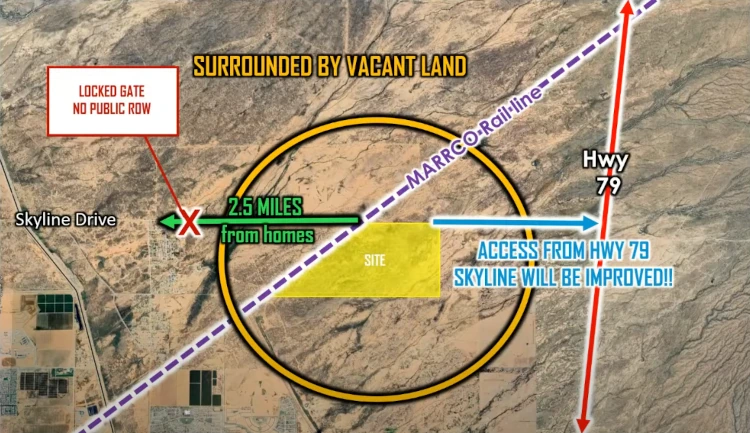
Skyline Drive currently ends at a locked gate and does not connect to Highway 79. Project approval requires the developer to build a 28-foot-wide paved road along Skyline Drive. The road will connect Highway 79 to the site within a 50-foot-wide right-of-way. Deokar noted the site plan showing these improvements is a draft.
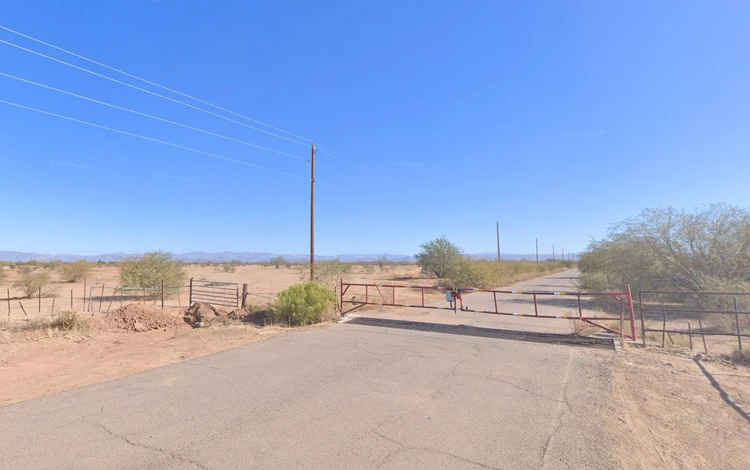
Rose clarified that the road will only extend east to Highway 79, not west toward existing neighborhoods. “There is no right of way to go west on Skyline, so the project will connect Skyline to the east, to the 79,” Rose explained.
Deokar explained that the project would utilize the existing railroad infrastructure to move goods. It would also connect Skyline Road to Highway 79.
The facility expects minimal truck traffic — two to three delivery trucks per week bringing materials to the site, plus trucks for exporting finished products, according to application documents. The railroad runs along the western edge of the property, offering a potential transportation option if needed.
Public Comments
Two residents spoke during the public hearing with questions about infrastructure and environmental impacts.
David Coward from Gold Canyon asked whether Skyline Drive would extend all the way to San Tan Valley or stop at Highway 79. He suggested the county require the applicant to help fund a full connection to San Tan Valley. The project, he said, would give residents better access to Highway 79 and jobs at the facility. “If we’re gonna do it, maybe we could help them or the county or whoever pay for that extension,” Coward said.
Charles Goff, president of Superstition Area Land Trust, raised broader concerns about large-scale industrial development in the area. “I’m increasingly disturbed, and I’m using this as the first opportunity I think I’ve come before the board, that whether it’s solar farms or 1,095 acres here,” Goff said.
Goff questioned whether the site would be graded clear of vegetation and what type of fencing would be installed. “If there’s no plants, there’s not gonna be any animals,” he said.
He called for comprehensive planning across the broader Superstitions area. “Where are the wildlife corridors? Where does it make sense to have them?” Goff asked. “Let’s give some guidance to people who are trying to make investments.”
Goff also cited research showing increased plant growth and pollinator activity in the presence of solar panels due to shade. “If you provide a little shade from Arizona’s sun, that means you’re not going to dry out the soil as much, of course you’re going to get more growth,” he said.
After closing the public hearing, Rose addressed Goff’s environmental concerns. “We are protecting the washes on the site and will preserve the open space with vegetation,” Rose said.
Supervisors Defend State Land Sales
Supervisor Mike Goodman delivered an extended defense of state land sales and their purpose. “There is a lot of misunderstanding or misconception that our residents have about state land and how it’s supposed to be used,” Goodman said.
“State land was given to and put into trust for the beneficiaries, which is our school systems, our education systems,” Goodman explained. “These were never designed to be sanctuaries that were never developed or anything else of that nature. These were intended to be used to benefit at some point the beneficiaries, which would be our kids, our future.”
Goodman noted the state is receiving record prices for trust land. “They’re getting high dollars for these properties now that they’ve never gotten in years,” he said.
He emphasized the project represents only preliminary entitlements. Goodman explained that the board is changing the zoning to increase the property’s value for state land beneficiaries. The change eliminates certain uses from the industrial zone.
Goodman highlighted the project’s economic benefits for Pinal County residents. He noted that many currently commute to Maricopa County for work. “This is shifting it back into our direction and keeping our residents more local to where they actually can live, work, and play in their own backyard,” Goodman said.
Chairman Raises Land Loss Concerns
Chairman Miller added concerns about land ownership patterns in the county. “The amount of private land that we lose to tribal trust each year is really shrinking our private ownership by quite a bit, which is a reduction in our tax revenue,” Miller said.
“I wish State Trust Land would start selling all kinds of land because we need more private land, and I’m happy to work with State Trust Land on these kinds of projects,” Miller added.
Supervisor Jeff Serdy assured Goff the board would oversee future development responsibly. “We’re stewards of the county, so some of the questions that Mr. Goff had, you just have to understand that we will take those matters into account,” Serdy said. “We don’t want a barren, no vegetation piece of ground.”
Miller agreed, referencing the research Goff mentioned. “I’ve seen the same studies about the solar panels and vegetation growing under it,” Miller said.
Final Approval
The board approved all three applications unanimously with no additional stipulations beyond those recommended by the Planning Commission.
The comprehensive plan amendment passed with no stipulations. The rezoning included two stipulations requiring the applicant to obtain all necessary federal, state, county and local permits before development. The board also approved 15 development conditions covering landscape buffers, riparian habitat protection, invasive species management, air quality standards, road improvements, and floodplain compliance.
Arizona State Land Department will auction the property after entitlements are secured. The successful bidder will be responsible for developing the manufacturing facility. Application documents indicate the project expects to create at least 300 jobs in its first phase.
